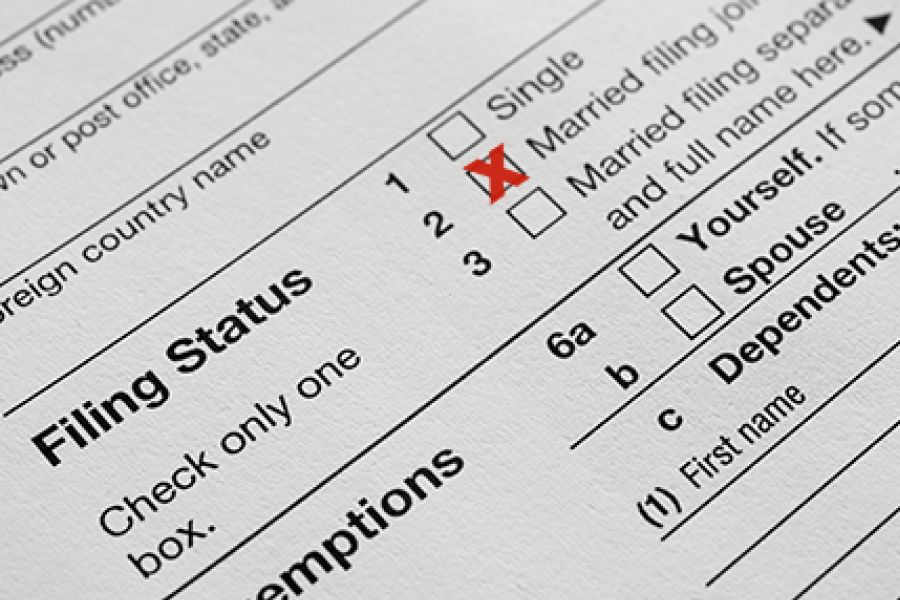If you file a joint tax return with your spouse, you should be aware of your individual liability. And if you’re getting divorced, you should know that there may be relief available if the IRS comes after you for certain past-due taxes . . . so-called innocent spouse tax liability relief. What’s “joint and several” liability? When a married couple files a joint tax return, each spouse is “jointly and severally” liable for the full tax amount on the couple’s combined income. That means the IRS can come after either spouse to collect the entire tax — not just the part that’s attributed to one spouse or the other. Liability includes any tax deficiency that the IRS assesses after an audit, as well as penalties and interest....

As a result of the current estate tax exemption amount ($11.58 million in 2020), many estates no longer need to be concerned with federal estate tax. Before 2011, a much smaller amount resulted in estate plans attempting to avoid it. Now, because many estates won’t be subject to estate tax, more planning can be devoted to saving income taxes for your heirs. While saving both income and transfer taxes has always been a goal of estate planning, it was more difficult to succeed at both when the estate and gift tax exemption level was much lower. Here are some strategies to consider. Plan gifts that use the annual gift tax exclusion One of the benefits of using the gift tax annual exclusion to make transfers during life is...
In some cases, investors have significant related expenses, such as the cost of subscriptions to financial periodicals and clerical expenses. Are they tax deductible? Under the Tax Cut and Jobs Act, these expenses aren’t deductible through 2025 if they’re considered expenses for the production of income. But they are deductible if they’re considered trade or business expenses. (For tax years before 2018, production-of-income expenses were deductible, but were included in miscellaneous itemized deductions, which were subject to a 2%-of-adjusted-gross-income floor.) The deductibility of portfolio management and related invesmtnet expenses requires determining if you’re an investor or a trader — and be aware that it’s more advantageous (and difficult) to qualify for trader status. Engaged in a Trade or Business To qualify, you must be engaged in a...
Despite the COVID-19 pandemic, the National Association of Realtors (NAR) reports that existing home sales and prices are up nationwide, compared with last year. One of the reasons is the pandemic: “With the sizable shift in remote work, current homeowners are looking for larger homes…” according to NAR’s Chief Economist Lawrence Yun. If you’re buying a home, or you just bought one, you may wonder if you can deduct mortgage points paid on your behalf by the seller. Yes, you can, subject to some important limitations described below. Points are upfront fees charged by a mortgage lender, expressed as a percentage of the loan principal. Points, which may be deductible if you itemize deductions, are normally the buyer’s obligation. But a seller will sometimes sweeten a deal...
COVID-19 has changed our lives in many ways, and some of the changes have tax implications. Here is basic information about two common situations . . . tax implications of working from home, and collecting unemployment. 1. Working from home Many employees have been told not to come into their workplaces due to the pandemic. If you’re an employee who “telecommutes” — that is, you work at home, and communicate with your employer mainly by telephone, videoconferencing, email, etc. — you should know about the strict rules that govern whether you can deduct your home office expenses. Unfortunately, employee home office expenses aren’t currently deductible, even if your employer requires you to work from home. Employee business expense deductions (including the expenses an employee incurs to maintain a...
If you’re getting close to retirement, you may wonder: Are my Social Security benefits going to be taxed? And if so, how much will you have to pay? It depends on your other income. If you’re taxed, between 50% and 85% of your benefits could be taxed. (This doesn’t mean you pay 85% of your benefits back to the government in taxes. It merely that you’d include 85% of them in your income subject to your regular tax rates.) Crunch the numbers To determine how much of your benefits are taxed, first determine your other income, including certain items otherwise excluded for tax purposes (for example, tax-exempt interest). Add to that the income of your spouse, if you file joint tax returns. To this, add half of the...
In the COVID-19 era, many parents are hiring nannies and babysitters because their daycare centers and summer camps have closed. This means that more parents may owe "nanny tax" this year. Keep in mind that the nanny tax may apply to all household workers, including housekeepers, babysitters, gardeners or others who aren’t independent contractors. If you employ someone who’s subject to the nanny tax, you aren’t required to withhold federal income taxes from the individual’s pay. You only must withhold if the worker asks you to and you agree. (In that case, ask the nanny to fill out a Form W-4.) However, you may have other withholding and payment obligations. Withholding FICA and FUTA You must withhold and pay Social Security and Medicare taxes (FICA) if your nanny earns...
Does your employer provide you with group term life insurance? If so, and if the coverage is higher than $50,000, this employee benefit may create undesirable income tax consequences for you. “Phantom income” The first $50,000 of group term life insurance coverage that your employer provides is excluded from taxable income and doesn’t add anything to your income tax bill. But the employer-paid cost of group term coverage in excess of $50,000 is taxable income to you. It’s included in the taxable wages reported on your Form W-2 — even though you never actually receive it. In other words, it’s “phantom income.” What’s worse, the cost of group term insurance must be determined under a table prepared by IRS even if the employer’s actual cost is less than...
While you probably don’t have any problems paying your tax bills, you may wonder: What happens in the event you can’t pay your taxes on time? Here’s a look at the options. Most importantly, don’t let the inability to pay your tax liability in full keep you from filing a tax return properly and on time. In addition, taking certain steps can keep the IRS from instituting punitive collection processes. Common penalties The “failure to file” penalty accrues at 5% per month or part of a month (to a maximum of 25%) on the amount of tax your return shows you owe. The “failure to pay” penalty accrues at only 0.5% per month or part of a month (to 25% maximum) on the amount due on the...
If you’re planning your estate, or you’ve recently inherited assets, you may be unsure of the “cost” (or “basis”) for tax purposes. Generaly, there is a stepped-up basis of inherited property. Fair market value rules Under the fair market value basis rules (also known as the “step-up and step-down” rules), an heir receives a basis in inherited property equal to its date-of-death value. So, for example, if your grandfather bought ABC Corp. stock in 1935 for $500 and it’s worth $5 million at his death, the basis is stepped up to $5 million in the hands of your grandfather’s heirs — and all of that gain escapes federal income tax forever. The fair market value basis rules apply to inherited property that’s includible in the deceased’s gross estate,...











